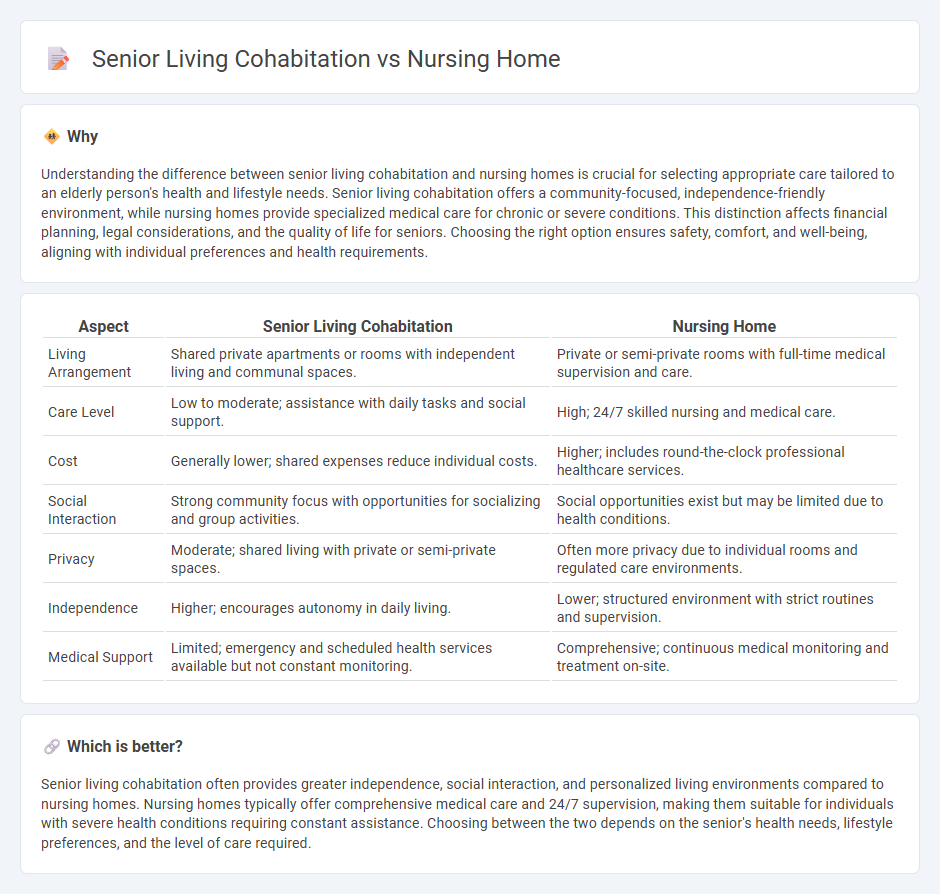
Senior living cohabitation offers a community-focused lifestyle with shared amenities and increased social interaction, promoting independence among older adults. Nursing homes provide comprehensive medical care and 24/7 support for individuals with serious health needs or mobility challenges. Explore the key differences to determine the best fit for your loved one's care and comfort.
Why it is important
Understanding the difference between senior living cohabitation and nursing homes is crucial for selecting appropriate care tailored to an elderly person's health and lifestyle needs. Senior living cohabitation offers a community-focused, independence-friendly environment, while nursing homes provide specialized medical care for chronic or severe conditions. This distinction affects financial planning, legal considerations, and the quality of life for seniors. Choosing the right option ensures safety, comfort, and well-being, aligning with individual preferences and health requirements.
Comparison Table
| Aspect | Senior Living Cohabitation | Nursing Home |
|---|---|---|
| Living Arrangement | Shared private apartments or rooms with independent living and communal spaces. | Private or semi-private rooms with full-time medical supervision and care. |
| Care Level | Low to moderate; assistance with daily tasks and social support. | High; 24/7 skilled nursing and medical care. |
| Cost | Generally lower; shared expenses reduce individual costs. | Higher; includes round-the-clock professional healthcare services. |
| Social Interaction | Strong community focus with opportunities for socializing and group activities. | Social opportunities exist but may be limited due to health conditions. |
| Privacy | Moderate; shared living with private or semi-private spaces. | Often more privacy due to individual rooms and regulated care environments. |
| Independence | Higher; encourages autonomy in daily living. | Lower; structured environment with strict routines and supervision. |
| Medical Support | Limited; emergency and scheduled health services available but not constant monitoring. | Comprehensive; continuous medical monitoring and treatment on-site. |
Which is better?
Senior living cohabitation often provides greater independence, social interaction, and personalized living environments compared to nursing homes. Nursing homes typically offer comprehensive medical care and 24/7 supervision, making them suitable for individuals with severe health conditions requiring constant assistance. Choosing between the two depends on the senior's health needs, lifestyle preferences, and the level of care required.
Connection
Senior living cohabitation and nursing homes are linked through their focus on providing supportive environments for elderly individuals requiring varying levels of care. Cohabitation arrangements often serve as a transitional option, promoting independence while offering assistance, whereas nursing homes deliver comprehensive medical and personal care. This continuum of care supports aging in place by addressing evolving health needs within residential settings.
Key Terms
Assisted Living
Assisted living combines personalized nursing care with the independence of senior living communities, offering residents support with daily activities while promoting social engagement and autonomy. Nursing homes provide more intensive medical care for individuals with chronic conditions or severe disabilities, contrasting with assisted living's emphasis on a balanced lifestyle. Explore detailed comparisons to determine the best care setting for your loved one's unique needs.
Independent Living
Independent living communities provide seniors with private apartments and access to social activities while promoting autonomy and minimal assistance. Nursing homes cater to residents requiring comprehensive medical care and daily support, distinguishing them from the more self-sufficient environment of independent living. Explore the benefits of independent living to determine the best fit for your senior housing needs.
Memory Care
Memory care in nursing homes offers 24/7 medical supervision, specialized dementia treatments, and structured routines tailored to residents with Alzheimer's or other cognitive impairments. Senior living cohabitation emphasizes a social, community-oriented environment with less intensive medical oversight, often promoting independence and peer engagement. Explore detailed comparisons to find the ideal memory care setting for your loved one.
Source and External Links
Vista Manor Nursing Center - Generations Healthcare - Provides quality total care nursing and rehabilitation with 24-hour licensed nursing, multiple therapy programs, and comprehensive patient services including stroke and orthopedic rehabilitation.
10 Best Nursing Homes in San Jose, CA - Lists numerous nursing home options in San Jose offering skilled care, with costs averaging around $6,562, tailored according to individual needs and budgets.
The Ridge Post-Acute - Offers 24/7 skilled nursing and a range of rehabilitation therapies, focusing on personalized care for recovery with professional nursing staff and comprehensive support services.
 dowidth.com
dowidth.com